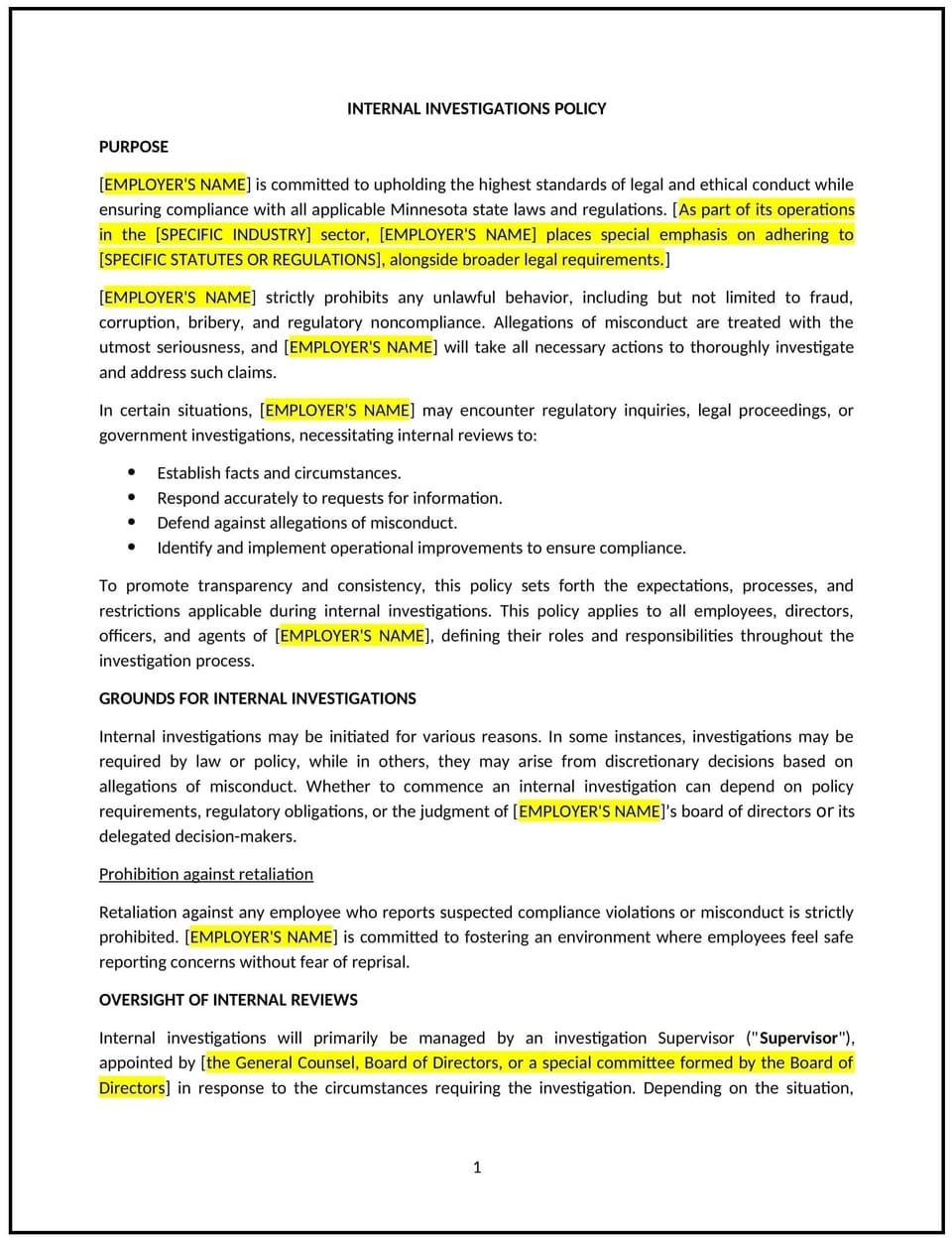Internal investigations policy (Minnesota): Free template

Internal investigations policy (Minnesota)
This internal investigations policy is designed to help Minnesota businesses establish a structured and fair process for addressing workplace concerns, complaints, or allegations. Whether businesses are investigating misconduct, policy violations, or ethical issues, this policy provides a framework to ensure thorough, impartial, and timely investigations. Tailored to Minnesota’s legal and operational environment, this policy emphasizes transparency, confidentiality, and accountability.
By implementing this policy, businesses in Minnesota can foster trust, address issues effectively, and maintain a positive workplace culture.
How to use this internal investigations policy (Minnesota)
- Define the scope of investigations: Clearly outline the types of issues that warrant an internal investigation, such as harassment, discrimination, theft, or policy violations.
- Establish investigation procedures: Provide a step-by-step process for conducting investigations, including gathering evidence, interviewing involved parties, and documenting findings.
- Assign responsibility: Designate qualified individuals or teams to lead investigations, ensuring they have the necessary training and authority.
- Ensure confidentiality: Protect the privacy of all parties involved and limit access to investigation details to those who need to know.
- Maintain impartiality: Conduct investigations objectively, without bias or favoritism toward any party.
- Communicate findings: Share investigation outcomes with relevant stakeholders while respecting confidentiality and privacy.
- Take appropriate action: Outline steps to address findings, such as disciplinary actions, policy changes, or additional training.
- Review and update the policy: Regularly assess the policy’s effectiveness and make adjustments as needed to reflect changes in laws or business needs.
- Communicate the policy: Share the policy with employees during onboarding and through internal communications to ensure awareness and understanding.
Benefits of using this internal investigations policy (Minnesota)
This policy offers several advantages for Minnesota businesses:
- Promotes fairness: A structured investigation process ensures issues are addressed impartially and consistently.
- Builds trust: Employees are more likely to report concerns when they trust that investigations will be handled fairly and confidentially.
- Reduces risks: Thorough investigations help businesses identify and address issues before they escalate into larger problems.
- Supports accountability: Clear procedures and documentation hold all parties accountable for their actions.
- Enhances workplace culture: Addressing concerns promptly and fairly fosters a positive and respectful work environment.
- Aligns with legal standards: The policy helps businesses align with Minnesota state laws and federal regulations related to workplace investigations.
- Improves decision-making: Investigations provide valuable insights that can inform policy changes, training, or other improvements.
Tips for using this internal investigations policy (Minnesota)
- Communicate the policy effectively: Share the policy with employees during onboarding and through regular training sessions.
- Train investigators: Ensure designated individuals or teams have the necessary skills and knowledge to conduct thorough and impartial investigations.
- Document everything: Maintain detailed records of investigations, including evidence, interviews, and findings, to ensure transparency and accountability.
- Be timely: Address complaints and conduct investigations promptly to prevent issues from escalating.
- Respect confidentiality: Limit access to investigation details and protect the privacy of all parties involved.
- Review the policy periodically: Update the policy as needed to reflect changes in laws, business needs, or industry standards.
Q: Why should Minnesota businesses adopt an internal investigations policy?
A: Businesses should adopt this policy to address workplace concerns fairly, build trust, and reduce risks.
Q: What types of issues should trigger an internal investigation?
A: Businesses should investigate issues such as harassment, discrimination, theft, policy violations, or other misconduct.
Q: Who should conduct internal investigations?
A: Businesses should designate qualified individuals or teams with the necessary training and authority to lead investigations.
Q: How can businesses ensure investigations are impartial?
A: Businesses should conduct investigations objectively, without bias or favoritism, and document all steps thoroughly.
Q: What steps should businesses take to maintain confidentiality?
A: Businesses should limit access to investigation details and protect the privacy of all parties involved.
Q: How should businesses communicate investigation findings?
A: Businesses should share outcomes with relevant stakeholders while respecting confidentiality and privacy.
Q: How often should the policy be reviewed?
A: The policy should be reviewed annually or as needed to reflect changes in laws, business needs, or industry standards.
This article contains general legal information and does not contain legal advice. Cobrief is not a law firm or a substitute for an attorney or law firm. The law is complex and changes often. For legal advice, please ask a lawyer.


